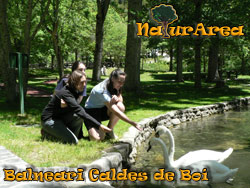| |
Home >
Garrotxa N.P. >
Saint Iscle and Vallac valleys
|
|
═ndice de Rutas
|

|
| |
|
|
| |
|
| |
|
|
|
located on the homonymous volcano and from there we will be able to
connect
with the route number 5 to go down towards Can Xel and Collet of Bassols.
These variants are also out of the route 19 that we are following.
The Volcano of Fontpobra is embedded in Sierra de Lleixeres. The crater is esasilly recognizable because it is recovered on his most part by chestnut trees.
The Volcano of Tuta which is only recognized by a round depression dug in the sedimentary rocks of Sierra de
|
Lleixeres, corresponds to the explosion of the crater.
If we continue by the itinerary, the next point is the Cerro de la Serrela (Hill of the Saws). We will have to take a deviation if we want to visit the
Volcano of Medes formed by three volcanic buildings: Puig de las Medes, Puig Rodˇ and Llacunagra.
Continuing the journey we will pass
several farmhouses and will be to arrive to Codina and Estanyol de Dalt where we will be able to see at our right hand the Volcano of Traiter
(just only 5 minutes walking), also formed by three volcanic
|
buildings that emitted lava flow that reached the bottom of the valley.
Later on, we will meet with another deviation that will take us to the castle of Puig Alder or hermitage of recently restored Ermita de Sant Salvador
(XI century).
This castle was part of the defensive line of the bishoprics of Vic and of Gerona. The original architecture of the castle was Romanesque but it was
modified during the half age and the modern age.
It was restored in 1984, and in that restoration was discovered a virgin that corresponds to the XIII century, named Mare del Salvador and actually can
be visited in the Museum of Art of Gerona.
From the castle, in the high of the hill, we will have a privileged situation and we will enjoy the landscape of Cogolls and Vallac valleys.
The journey follows the torrent of Vallac until arriving Sant Feliu de Pallerols.
|
|
|
|



